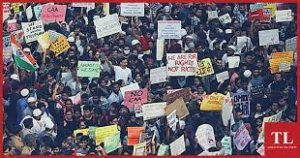
Is India's Image Being Damaged by Ignoring Criticism of Infractions of Human Rights?

Overview:
India has been identified as the site of numerous human rights cases of abuse by US government agencies and several non-governmental organizations.
Many of them are significant and some are believed to have been committed by state and federal agents. Under the party’s leadership, it is reportedly rising, especially since its convincing national re-election in 2019. Several investigations also, warn of the retreat of Indian democracy.
In 2021, the US-based nonprofit Freedom House once again called India “partially free” and said, “Modi and his party are tragically pushing India toward authoritarianism.”
Religious Freedom:

Approximately 80% of Indians are Hindus and around 14% are Muslims. The US State Department’s 2021 International Religious Freedom Report (IRF) claims that “attacks against members of religious minorities occurred throughout the year, including killings, assaults, and intimidation” in India.
It noted a “cattle alert” against non-Hindus based on allegations of cattle slaughter or beef trafficking, nearly doubling the number of reported violent attacks on Christians to more than nine on average per week, and the adoption of laws restricting religious conversions in ten Indian states.
In March 2022, the United Nations HCHR expressed concern over “recent statements and actions expressing hatred and violence against religious minorities” in India, particularly two incidents in late 2021, Hindu nationalist leaders are trying to make India a Hindu country.”
Freedom of Media:

While the Indian government generally upheld press freedom in 2021, according to the State Department’s 2021 Country Reports on Human Rights Practices, “there were instances in which the government or actors considered close to the government allegedly pressured or harassed media outlets critical of the government, including through online trolling.
” It mentions “restrictions on free expression and media, including violence, threats of violence, or unjustified arrests or prosecutions against journalists.” Paris-based Reporters Without Borders (RSF) 2022 Press Freedom Index places India 150th of 180 nations, thus continuing a six-year downward trend. India, which RSF refers to as “one of the world’s most dangerous countries for the media,” has “press freedom in crisis.”
Freedom of Expression:

HRR claims that in 2021, violations of online freedoms included censorship of web content, disruptions of internet access, restrictions on access to the internet, reports that the government occasionally monitored users of digital media, and the “use of criminal libel laws to prosecute social media speech.” The organization said in 2022 that “Freedom of expression is not safe in
India.” In India, according to Freedom House, “academic freedom has significantly weakened in the past few years, as intimidation of professors, students, and institutions over political and religious concerns has increased.” The Indian government is applying increasing pressure to U.S.- based social media sites like Twitter, WhatsApp, and Facebook over the businesses’ refusal to cooperate with data and takedown demands, including video streaming platforms such as Netflix and Amazon have been under pressure for having content that Hindu nationalists and the Indian government consider to be disputed.
Human Rights in Jammu & Kashmir
Jammu & Kashmir was the only state in India with a majority of Muslims until recently; now there are almost none. In 2019, the government abolished Section 35A of the Annex and Article 370 of the Indian Constitution, eliminating the state of its (in theory) self-governing nature and dividing it into two “Union Territories,” each with fewer administrative rights. The HCHR office of the U.N. stated that the modifications “risk undermining minorities’ rights.” According to Human Rights Watch’s (HRW) 2021 World Report, “The government continued to impose harsh and discriminatory laws on Muslim-majority areas” of Kashmir.
Freedom of Association & Civil Society
Through politically motivated legal proceedings, tax inquiries, suspicions of financial irregularities, and the use of the Foreign Contribution Regulation Act (FCRA), the legislation regulating foreign funding for nongovernmental entities, officials harassed and threatened activists and human rights organizations.
The headquarters of the well-known human rights organization Centre for Promotion of Social Concerns in Tamil Nadu state were raided in January by India’s principal investigative agency, the Central Bureau of Investigation, on suspicion of fraud, financial irregularities in violation of the FCRA, and many other things.
Mohammed Zubair, the co-founder of the independent fact-checking website Alt News, was detained by Delhi police in June after they claimed he offended Hindu feelings in a 2018 Twitter tweet. The arrest of Zubair seemed to be punishment for outing a television news outlet that aired contentious statements made by a BJP politician related to the Prophet Mohammed, leading to criticism by several Muslim governments.
Conclusion:
The Foreign Contribution Regulation Act (FCRA) continues to target human rights NGOs. To comply with its commitments under international human rights law, India has so far failed to accept several suggestions made by UN human rights experts, UPR, and other human rights agencies to abolish or modify the FCRA statute. In the end, breaches of human rights occur because they are being committed in a nation that takes pleasure in protecting these fundamental liberties.







